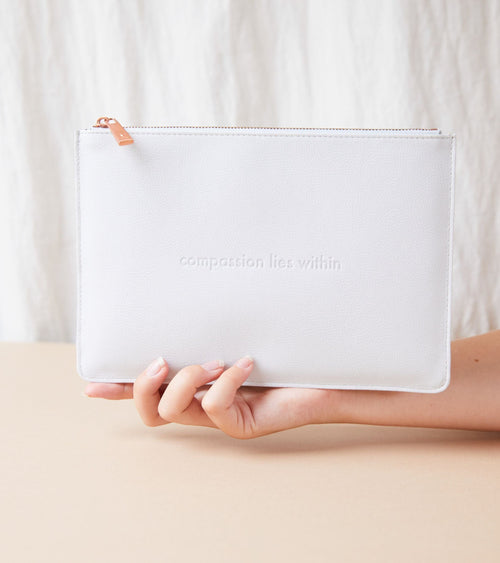 Written by Culthread, a female-founded outerwear brand whose mission is to make luxury vegan quality jackets, with all the pockets we could ever ask for. Shop the collection at www.culthread.com.
You’d have to be living under a rock to be unaware of the damage that plastic is causing to our planet. In short, plastic is being produced at an alarmingly rapid rate all over the world and takes upwards of 500 years to degrade (if it degrades at all). This means that it’s piling up in landfills and littering our oceans.
In 1950 the world produced only 2 million tonnes per year. By 2015, annual production had increased nearly 200-fold, reaching 381 million tonnes. This exponential increase isn’t set to slow down any time soon. In that time we’ve also seen a huge increase in the use of polyester (aka plastic) in the manufacture of clothing, and more specifically in fast fashion since the fabric is cheap to produce. Find out more about the impact that fast fashion is having on our planet here.
Now, almost half of the world’s clothing is made of polyester which is an energy-hungry, non-sustainable synthetic fibre. But there’s a new trend that’s catching on, thanks to brands like adidas, Patagonia, Mara Hoffman and more.
The fabric itself is made by:
Written by Culthread, a female-founded outerwear brand whose mission is to make luxury vegan quality jackets, with all the pockets we could ever ask for. Shop the collection at www.culthread.com.
You’d have to be living under a rock to be unaware of the damage that plastic is causing to our planet. In short, plastic is being produced at an alarmingly rapid rate all over the world and takes upwards of 500 years to degrade (if it degrades at all). This means that it’s piling up in landfills and littering our oceans.
In 1950 the world produced only 2 million tonnes per year. By 2015, annual production had increased nearly 200-fold, reaching 381 million tonnes. This exponential increase isn’t set to slow down any time soon. In that time we’ve also seen a huge increase in the use of polyester (aka plastic) in the manufacture of clothing, and more specifically in fast fashion since the fabric is cheap to produce. Find out more about the impact that fast fashion is having on our planet here.
Now, almost half of the world’s clothing is made of polyester which is an energy-hungry, non-sustainable synthetic fibre. But there’s a new trend that’s catching on, thanks to brands like adidas, Patagonia, Mara Hoffman and more.
The fabric itself is made by:
- Collecting once used clear plastic such as water bottles, sterilizing, drying and breaking it up into small chips.
- Heating the chips and passing them through a spinneret to form strings of yarn which is then wound up in spools.
- The fibre is then passed through a crimping machine which creates a fluffy, wooly texture.
- Finally, the yarn is baled, dried and knitted into polyester fabric.

- Less plastics going to landfill or ending up in our oceans. Using plastic is so ingrained in modern day society, it’s very hard to give up completely. If we’re to combat the problem of excessive amounts of plastic waste taking over our planet, we need to find innovative ways to recycle.
- It takes less resources to make, and is almost the same as virgin polyester in terms of quality. It’s production requires 59% less energy than that of new polyester according to a 2017 study by the Swiss Federal Office for the Environment. Plus, it’s manufacturing process doesn’t include the extraction of crude oil and natural gas from the Earth.
- Recycled polyester can be recycled over and over again without too much degradation of quality. Currently the cycle won’t last indefinitely, but the fibres will stay intact for many years. Scientists are working to make the cycle a closed loop, meaning that in theory, we could live in a world where no new plastic is created for use in garments.
- Garments made from a blend of polyester and other materials are more difficult, if not impossible to recycle. Sometimes the recycled fibres are mixed with virgin fibres to strengthen them. This is still better than using 100% virgin plastic but doesn’t quite solve our problems.
- Harmful dyes can be used in the recycling process. Polyester chips generated in the manufacturing process sometimes turn out crispy white, but can also turn out creamy yellow, making color consistency difficult to achieve. This leads to some manufacturers using chlorine-based bleaches to whiten chips. Redying requires high water, energy and chemical use.
- Recycled plastic garments shed microfibres when washed. This also happens when we wash our virgin polyester clothing, but even more so when washing recycled fibres. These particles end up being passed through our sewers into our oceans. They’re small enough to be eaten by plankton, eventually moving their way up the food chain and onto our dinner plates.
 The reality is that we’re making leaps and bounds as far as technology is concerned but we’re still not quite there yet. It’s still much more expensive to make recycled polyester than it is to make it new, so we’re a long way from seeing fast fashion brands adopt the more environmentally friendly alternative.
What we can do as consumers is consume less, and if we do feel the need to consume, we make sure to educate ourselves and shop smart. We’ve written about our top tips on how to live more sustainably, if you’d like to read on, head over to our blog.
The reality is that we’re making leaps and bounds as far as technology is concerned but we’re still not quite there yet. It’s still much more expensive to make recycled polyester than it is to make it new, so we’re a long way from seeing fast fashion brands adopt the more environmentally friendly alternative.
What we can do as consumers is consume less, and if we do feel the need to consume, we make sure to educate ourselves and shop smart. We’ve written about our top tips on how to live more sustainably, if you’d like to read on, head over to our blog.
At Culthread, the new collection utilises recycled polyester as well as Thermore Eco Down for insulation. Shop the collection online at www.culthread.com
Sign-up here to hear more about vegan fashion and beauty and be the first to hear about ticket releases for our next event…
Click HERE to get your tickets to Bare Fashion.
 Image credit: Culthread
Image credit: Culthread



0 comments